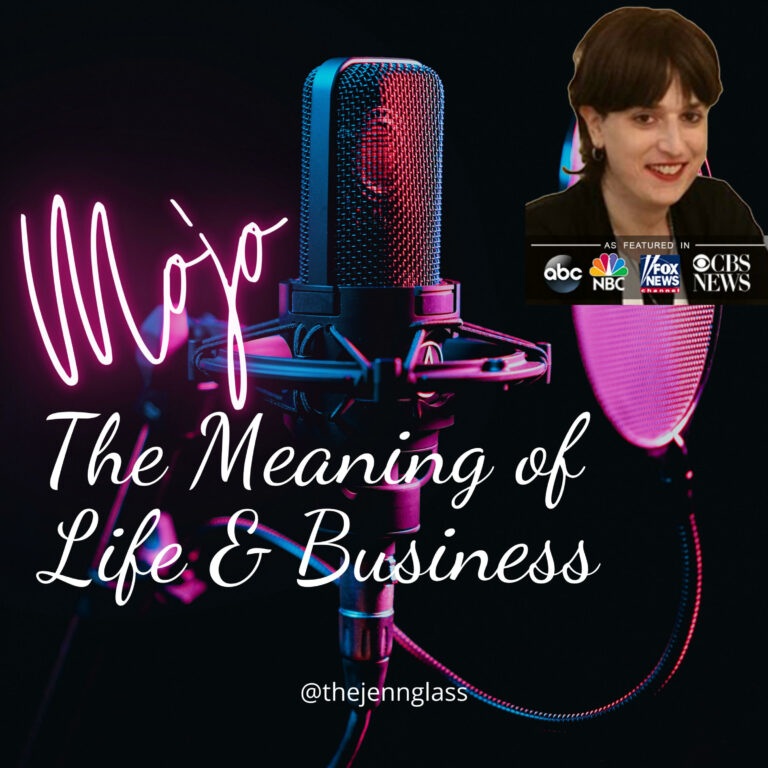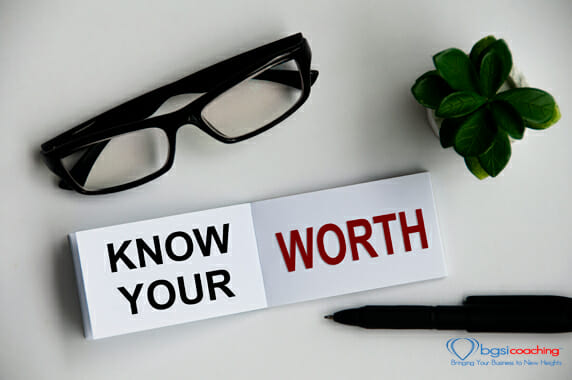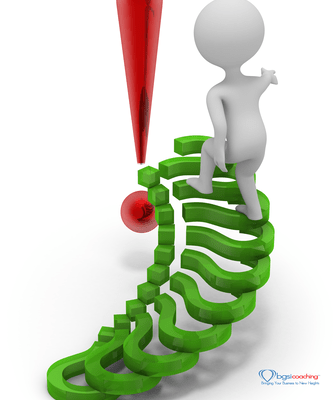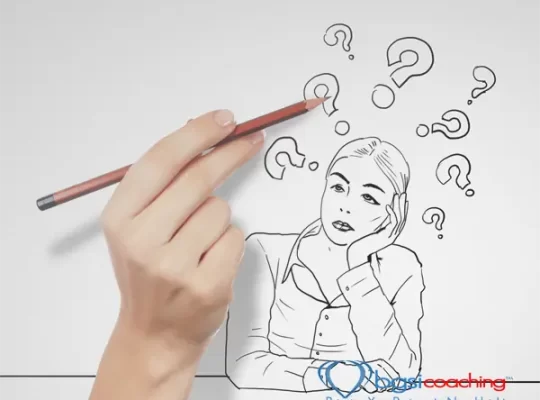In this episode of MOJO: The Meaning of Life & Business, we sit down with Coach Gail Jones and discuss “being stuck” and worthiness.
Whether you had an upbringing where you were shown love and worthiness or weren’t shown or taught self-worth and self-esteem, many adults are still battling those issues today.
How can you start overcoming the lack of self-esteem and self-worth? That’s exactly what Gail and Jennifer talk about on this episode of MOJO: The Meaning of Life & Business.

Life & business intersect in many places. After all, we cannot have a business without looking at the human component of business.
This podcast with Jennifer R Glass, CEO of Business Growth Strategies International & BGSICoaching.com is all about the meaning of life and business & the interesting ways they intersect. The show is for entrepreneurs and aspiring entrepreneurs on the search for what makes people successful and how to get there themselves.
Listen in as Jennifer & her guests dive deep into what makes people tick & how they make their businesses work for the betterment of others.
In this episode of MOJO: The Meaning of Life & Business, we sit down with Coach Gail Jones and discuss “being stuck” and worthiness.
Whether you had an upbringing where you were shown love and worthiness or weren’t shown or taught self-worth and self-esteem, many adults are still battling those issues today.
How can you start overcoming the lack of self-esteem and self-worth? That’s exactly what Gail and Jennifer talk about on this episode of MOJO: The Meaning of Life & Business.
About Gail: Gail Kauranen Jones, known as “Coach Gail Jones,” is a nationally recognized worthiness coach featured on TV (CBS’ Emmy award-winning talk show, The Doctors), radio (Sirius XM), and is a guest writer for Maria Shriver’s Sunday Paper and executive contributor to Brainz Magazine. She is the author of two books, “Cancer as a Love Story: Developing the Mindset for Living,” and “To Hell and Back…Healing Your Way Through Transition.”
Her cancer healing journey played a key role in rebranding her business around worthiness, for she learned, that claiming one’s worthiness to live can extend longevity.
Connect with Gail on Linkedin, Instagram, Facebook, Twitter, YouTube, and on the web at https://claimyourworthiness.com
#Mentalhealth #Mentalhealthawarenessmonth #Parents #Educators #Teens #Children #Collegestudents #Suicideprevention #Perfectionism #Youareenough #claimyourworthiness #selfesteem #selfworth #worthiness #obstacles #coaching #worthinesscoach #selfhelp #personaldevelopment #selfrespect #pride #selfpride #happiness #selfconfidence #confidence #selflove #selfregard #sufficiency #selftrust

Transcript (auto-generated; may contain errors):
Jennifer Glass (Business Growth Strategies International)
Hello, and welcome to another episode of MOJO: The Meaning of Life & Business. A lot of times we think that we’re stuck. We think that there’s something causing us to be stuck. Something that is making us say, Well, I’m not worthy. I’m not in a position to really grow. I’m not in a position to do a lot in terms of what I’m trying to do. And we run into these problems from time to time because of different. Thoughts that may be in our head going back many years. And I’ve got a really incredible guest with us today who’s going to help us dissect what it is that actually may be causing those problems. So you’re not stuck for the reasons you think you are and how we can also try and figure out how can we work around those issues in terms of what we’re doing. Before I bring my guest on, though, let me tell you a little bit about her. So you know why she’s so incredible and why she’s somebody that I wanted to have this conversation with on this episode.
Gail Kauranen Jones, known as Coach Gail Jones is a nationally recognized worthiness coach, featured on TV, radio, and is a guest writer for Maria Schreiber Sunday Paper and an executive contributor to Brains magazine. She’s the author of two books, “Cancer as a Love Story: Developing the Mindset for Living,” and “To Hell and Back…Healing Your Way Through Transition.” Her cancer healing journey played a key role in rebranding her business around Worthiness. For she learned that claiming one’s Worthiness to live can extend longevity. Gail, that’s an incredible bio. And thank you so much for coming on the show.
Gail Jones
Well, thank you for sharing that bio. I really appreciate it. You really covered all the pieces of how Worthiness is developed and what I want to share about teaching it to others.
Jennifer Glass (Business Growth Strategies International)
Absolutely. Thank you. And so, Gail, let me ask you, before we jump into Worthiness and reasons that we’re stuck, there’s a lot of things that I just mentioned in your bio, though. Tell us something, though, that wasn’t in your bio. That is, Gail.
Gail Jones
Okay. I think that we all have different adversities in our lives, and our challenge is to translate still. That adversity into a service. So when I look back at my healing journey, whether it’s cancer or whatever, I know that my worthiness teaching the worthiness came from my not having worthiness, right? We teach what we need to learn. And I grew up with a schizophrenic mom, so I never got the nurturing of those first seven years that are key to developing nurturing. But we always have a choice whether to be a victim or to turn that around. And I feel it’s my calling to teach other people how to instill that worthiness so they don’t live with the pain of life as an unworthy person. It’s very painful to live feeling unworthy without a question.
Jennifer Glass (Business Growth Strategies International)
Self worth, self esteem. Feeling that one’s place in the world is one’s place, and not that they’re just relegated to being. I’ve. The old saying goes, chop liver. It’s extremely important. And too many people, unfortunately, discover that too late in life that they really weren’t living what they could have lived, the life that they could have lived simply because they were afraid, because they were dealing with thoughts from when they were in their formative years that they weren’t taught, like you were saying, self worth. So as we look though, at that self-worth and we look at issues that are surrounding it, we know that from birth to six, seven years of age, we know that that is the formative years. We know that a lot of the thoughts even about money, right? Absolutely. In that time, one of the things that I’ve shared in the past is that if you are. If you were seeing your parents always flipping out about money and they were always concerned and I can’t spend it here. I can’t spend it here. You’re going to have the same mindset of missing the money, right? Not that it’s right.
Gail Jones
We inherit our parents mindsets on money often, but I want to go back to those first six years and just say when we revisit them to rewire our brains for worthiness, which is what I help clients do, I actually help repair them for those first six years. The most important thing for people to know this is done with love and compassion, not judgment. We didn’t have the discernment skills as young children six to know this wasn’t about me. So, for example, when my mom wasn’t paying attention to me and that made me feel less than I didn’t know as a little kid that she was mentally ill. So I made it about me. Right. So it’s. It’s really important. Loving, compassion, heals. And the other thing to understand is that to heal worthiness. Or you can read all the books, all the self-help books, you can go to all the seminars, but you have to be lovingly, witnessed, witnessed. So in coaching, when I witnessed someone one on one, and I’m giving them love and compassion as they share all the trauma drama, we don’t stay there. But they’ve held it in their whole lives. They were good kids, right? They were good kids. To survive. When they survived, they have to be seen, heard, validated in knowledge for the pain. We don’t stay there. We move forward fast. But you can’t forget that the love and compassion, peace and being witnessed by a competent adult.
Jennifer Glass (Business Growth Strategies International)
When we think about then the times that we were hoping as kids to have had that acknowledgement, that parenting that we wanted. Unfortunately, we’ve seen some students. Athletes over the years not be in a position for them to deal with all of the issues that are thrown at them being student athletes, being thrown at them, being kids in school.
Gail Jones
The pandemic has been an issue. And we were talking about this in the green room earlier.
Jennifer Glass (Business Growth Strategies International)
Gail, how can we look at these kids and really start shaping a difference for the future in terms of what we’re looking at for the kids out there? Now I’m thinking about my own kids.
Gail Jones
Great question. So the first thing I would say is, as parents, we need to be honoring our kids for who they are, not what they do. All their performance does not make them worthy. And even as adults in the working world, you’re, you get. Like great accolades. I was on national TV, national radio. That does not make me worthy. Worthy comes from within. And especially now with the challenging world circumstances. If we focus on the surface circumstances, we can go down very fast. We have an innate sense of worthiness. We are grounded no matter what’s happening around us. And the most important message parents can give young children, all children, but especially those zero to six is loving them for who they are. Unconditionally loving them who they are isn’t like, oh, you got an A on your report card or you made a great friend. It’s like, I love you because you’re so kind. I love you because you’re playful. I love your spirit. Find qualities about your child that you love that aren’t based on performance, that are a reflection of their essence.
Jennifer Glass (Business Growth Strategies International)
For the Tiger, moms probably would be a little less. In favor of the ideas that you’re sharing now, given that it’s grades and the music or whatever it is that they’re getting their kids to. So if you were working with a Tiger mom, I’m imagining you would try and help her see the same idea. But very often Tiger moms are living with the same because that’s what their parents were. Right.
Gail Jones
And that’s why we have to be very loving and forgiving because we’re only parenting how we were parented. And I feel this whole platform around Worthiness is breaking generational wounds. None of us were given it because our parents weren’t given it right. And their parents weren’t given it. Now you have the ability to establish a strong foundation of where there’s knowing how to do it, and also high self-esteem for kids. But the number one thing I would say to all parents and all of us, even as professionals in the business world, the greatest gift is taking. To give somebody is your presence okay, when you can actually sit and listen? And I’ll just share an example of what happens. And I know we’re all dealing with the social media age and the challenges of that. But I’ve heard so many stories of a parent goes to pick up a child from day, daycare. Right. In the old days, older days, the kid would come running to the parents, so excited to see them after being in daycare all day. That excitement isn’t there anymore for a lot of kids because everybody’s so distracted. The worst thing a parent can do if they go to pick up their child from daycare or the kids come home from school and you’re on your cellphone. Right. And you continue talking on that cell phone. What you’re telling your child in that moment. And this is how beliefs have formed, these subconscious conscious beliefs from the first six years of life that run us for life is they don’t matter. Put down the phone and be present. And it takes conscious effort to do that, especially now and. Now, I have a lot of empathy for parents, because I can’t imagine being parents of young children right now in the challenging times of the pandemic at the time this is being recorded. And also we’re seeing a lot of data coming in and how it is impacting and young children. And it’s not being why they reported, but parents need support, too. So we need to love parents and see them as worthy as well as them giving it to their children.
Jennifer Glass (Business Growth Strategies International)
And that’s really powerful if you think about it. It’s all about what are you doing to show those around you, your children, fellow parents, people in your working place, that it is all about showing them they’re worthy. And it’s amazing how sometimes that little bit of. Going out of your way to show someone that you actually care about them can have such an amazing impact.
Gail Jones
I’m sorry. These four key words that make somebody feel worthy helps them feel worthy. To be seen, heard, validated and acknowledged. I said at the beginning, but when you’re present to somebody, you are seeing them, you are validating them, you are acknowledging them, you are making them feel valued. And it means stepping out of whatever’s going on in your life now to be present. I keep on going back to the presence. It’s so missing today. We all want to be seen and especially because of people being so isolated to be seen and really look eye to eye and feel somebody’s heart. That takes and discipline. And for parents that are running in all different circles right now, for them to have somebody be present to them, I can’t imagine the choice of some of them I have to make on a daily basis. But to have. Them experience their presence that will automatically elevate their sense of worthiness so they can model it for their children.
Jennifer Glass (Business Growth Strategies International)
Let me ask you, one of the things that you mentioned earlier is that you learned what you need to learn and you teach what you need to learn and the worthiness around your cancer diagnosis and the recovery process. And thank God, I hope that everything is better and we’ll stay that way. But in terms of realizing that there was an issue to begin with, because so many people, it doesn’t matter if it’s about working worthiness, if it’s about needing help in another area, we’re just too embarrassed very often to admit that we need help. The question is if you’re. Talking with any of our listeners and you are really getting inside of their mind and you are making them question, do I consider myself worthy? What would be me some of the questions that they would even need to be asking themselves to figure out, do I really consider myself worthy? Yes. Like you said, being on national TV.
Gail Jones
But that doesn’t mean worthy. That’s just based on the accolade.
Jennifer Glass (Business Growth Strategies International)
So what would I need to be thinking about to know if I am seeing myself as worthy? Or maybe I need that help, too.
Gail Jones
Right. So I just want to say one thing, going back to the cancer diagnosis is that on the outside again, I looked really successful to the inside. I was running on fight or flight my whole life having had a schizophrenic mom. Right. So my body just broke down. I just couldn’t take any more of that. Ron. It had to stop. So I just want to share that it’s going inward. In order to claim your worthiness, you absolutely must go in with and understand nothing outside of you is going to give that to you. Nothing not made, not a job, not money, not the perfect home. You have to go within and claim it, but how we know we’re not in worthiness. And a lot of it, 90% of my clients have been men once. But I think women are more conditioned to give to others at the expense of themselves. So key ways to know you’re in unworthiness are that you overgive and think you have to give to get we are worthy as is. We don’t have to do anything to get something. So women tend to overgive in relationship. You tend to attract takers if you’re unworthy because you haven’t learned to receive. So one of the key things I would say is to practice receiving. This relates to business as well, because if you can’t receive and again, when you’re conditioned to give to others, which a lot of women are especially mothers, it’s a whole new ballgame to learn to receive. And it’s uncomfortable when you first learn. And if you don’t learn to receive, you will not receive money. It could be right in your face and you’ll push it away. Oh, I don’t need to do that, or I can give a free seminar. So you’re paid your worth. When you know your worthiness, you set a limit on what you know what you’re worth and you ask for what you’re worth. The other way it plays out. And I know when we have an unworthiness issue that a lot of us hide in shame. For a long time I felt shame that I had a schizophrenic mom, like nobody came to my house that was off the charts, no way. And then I had to become more visible to do my business. And so I had to walk through a lot of shame to do. Do that and be worthy to stand there and share the message independent of what you thought about my earlier years or whatever. So being visible is key to being worthy. But I want to say it’s a fine line because I think some people have visible to the extreme. I think it has to be with authenticity, to be visible with authenticity that you’re there to share a message. You’re not visible just to take a stage, which I’ve seen a lot happen in my profession. But you’re visible because you have a message to share that comes from your heart, and you’re standing there sharing that message because you have done the work you have to have done the work to stand up there and share the message and to guide others through the journey. So I’d say it shows up in relationship, it shows up in money, it shows up in giving to get and the visibility. I’ll just share one thing on the visibility. I do a lot of work with vision boards, but I do them based on nerves, clients. Been trained in neuroscience. So when you’re creating a new vision board for your business or your personal life or both, you want to have a picture on that vision board of yourself smiling and happy. You want to be happy in your vision. But this is my little thing, I add. This is my secret that I’m sharing with your listeners to have a picture of yourself as a child three to five, because that child needs to know that they are worthy to be in that vision and that you’re going to make them feel safe. So even before I went on TV, The Doctors, the Emmy Award winning show, as much as I felt confident in my message, I had to reassure my little girl within who didn’t get that nurturing the first five years, that I was going to make her feel safe no matter what happened on the show. It wasn’t about the show, but she was going to feel safe being visible. I was going to love her no matter what, and that she was worthy of doing this journey with me. So I think we have to make a relationship with our iPad in a term. Child the rest of our lives. We’re reparenting that child constantly, constantly, constantly. Even if we had a great childhood, we have an inner child within us that needs to always be told they’re worthy and we’re listening and we’re acknowledging and we’re evaluating them. Does that make sense?
Jennifer Glass (Business Growth Strategies International)
It absolutely makes sense. And so much of what you are just saying has struck way too many chords to even begin to count. Just to share really quick story. There was maybe about 910 years ago, there was an event. I eventually spoke at that event. But the speaker that was at this particular event, about four months or so before I was supposed to be speaking at a similar program, she was at that time. You’re. Nine months pregnant. And she was in the beginning I missed when she was setting up the room, how she wanted the room set up. But at the end of the program, everyone else had left and had stuck around. And I’m sitting there thinking, there’s this woman who’s about to go into labor any day, and she’s going around to all the tables collecting her flowers and her vases and all the marbles that she dropped in and whatever else was on the tables for her. And I said, this is ridiculous. Let me go around. I can help and certainly not expecting anything in return. But it was while I was going through my divorce, and so there was a lot of emotion just to begin with. And when you’re in divorce, you never want to get because it’s usually not something good. But while I was going through that up. Process of divorce, I help this woman. And today we’re good friends. Didn’t know her from Adam then, but when I was helping her at the end, she said, listen, she had a gift card that she wanted to give me for an hour massage. She told me she wanted to give it to me. And that the only condition was that I had to agree to use it on myself, not to gift it to someone else. And I just broke down, broke down in front of a complete stranger at the time. And it was one of those experiences that here I was, everything in divorce, between the filings and the complaints and everything that you’re dealing with, you’re made to feel less than whole.
Gail Jones
Absolutely.
Jennifer Glass (Business Growth Strategies International)
And here she was. No reason. Other than saying thank you, but a simple thank you for me would have sufficed giving that to me and just completely breaking down. And it was one of the few times times that I really did break down like that in front of a complete stranger. 911 was probably the other big time, but other than these national times, it was really a lot less. So when you were talking about the giving and getting and the other areas that you were mentioning with how to really know because that there’s a sense of worth really just rock many chords. And I just thought that I should mention that because if any one alt. And if you are listening and you felt the same way, I would strongly suggest that you see what you can figure out in terms of your worth or else reach out do Coach Gail. And we’ll let you know in a little bit how you can reach out to Coach Gail. But let’s go on, though, to the conversation.
Gail Jones
So that was a defining moment and learning how to receive. So what I would suggest to you or anybody who has that first moment or a couple of moments, first of all, is to write it down. So we track evidence of knowing we’re worthy. It takes 20 seconds to create a new neural pathway in the brain. So no matter whether we’re 20, 50, 60, whatever, we have to rewire our brain for the new. So if we track evidence of when we know we’re worthy, even if it feels awkward. Okay, I receiving. Part of Worthiness, right? If you wrote down today, I got this massage certificate for what I did. And even though it was hard to accept, I accepted it. And keep on tracking evidence of ways you receive. You’re going train the brain to receive. It’s going to feel uncomfortable at first because you didn’t. But you just explained it beautifully. So thank you for sharing that story. That’s an excellent example of rewiring your brain for Worthiness. And I’m not surprised you would break down because you are creating a new story. You just broke the story of your past in that moment by accepting that gift.
Jennifer Glass (Business Growth Strategies International)
Thank you.
Gail Jones
Yeah. A lot of courage to break these stories without a question.
Jennifer Glass (Business Growth Strategies International)
You have to. As I always say, in order to grow, there has to be change. You can’t sit still and expect to grow and expect to be anything different than what you were yesterday. And so change is absolutely necessary. And like you’re saying, writing down those moments, figuring out those moments are really important. So let’s look, though, at the business side, when we’re stuck, there’s a lot of issues that are out there that make us stuck, that we can’t seem to see the cars for the trees and what we’re dealing with. What are some of the issues, though, in that regard? I mean, the worthiness is, of course, a major component. But how do we start seeing that and start admitting whether in a business perspective, in a personal perspective that we really need to be looking at? Well, something isn’t working and we need to deal with it?
Gail Jones
Well, first of all, I want to say, because we are living in these times of the pandemic, moving. We’re in the process of creating a new world. So the old paradigms don’t work. The old thinking doesn’t work. The old beliefs don’t work. So it’s common right now for people to feel stuck. Okay. It’s very common because, because who we were a couple of years ago isn’t who we are now. And the whole model of what we’re going to need to go forward is very different. So I think that the first thing to do is to honor. We all have unique gifts to bring to this new world unfolding. And a couple common themes that are really important are authenticity. So when we’re stuck, I would ask ourselves, where are we not being authentic? Like, sometimes we’re in a role that might have been a role that fit us in our 20s, but it doesn’t fit us in our 40s. Is this still the role for me? Is this really authentic to who my soul wants me to be right now? So authenticity is right up there. And then another. It’s. Is connectedness. So I don’t know if you’re familiar with Adam Grant. He’s a business psychologist, but he says the companies that are going to thrive are going to be the ones that recognize belonging is key. So another the question I would ask when I’m stuck is where do I belong? I might not belong in a corporate structure anymore, or I might not even belong being an entrepreneur anymore, or I might belong being a mom because I’ll always be a mom, but I might not belong with the moms I’m connecting with. So where do I belong? And then to answer that question as you’re asking yourself that question, I would also ask because we’re all being elevated, even though it doesn’t feel like it right now, it feels like a big crash. But we’re all being elevated to a bigger version of ourselves that’s going to serve the new world in a new way. So we have to align with different types of people. So the other question I would ask is who can in halt. Well, who has the capacity to hold me? And I’ll just share this story about capacity. It’s really important. Gay Hendrix wrote the book The Big Leap. I recommend it to everybody recommended 20 years of my coaching practice. But as we elevate, people are going to go away. They don’t intentionally do it, but our success threatens them subconsciously. Even people in our inner circle, even family members, won’t be there for us. As we elevate the story, it’s lonely at the top. It is briefly until we meet new people of capacity and who are the people that have capacity to hold us in our growth? They’re going to be very different than they were before. So you want to build a tribe side of people that have the capacity. I’ll just show you an example. Right before I was getting ready to go on national TV, I had just rebranded my worthiness after 20 years of business and worked 24/7 during the new website. And all of that. And somebody who watched me go through all of this was very supportive. And then when she saw the link to the TV show, it was during COVID. So we had to shoot it off site and send the link and all that. She’s he said, oh, that’s great. What are you going to do next? Totally dismissed that I was on TV. It wasn’t about the TV. Totally dismissed that. I’d just taken a major, big leap to share my message to 4 million people. This is very common when we go up, right. And I don’t mean up in an egotistical way up in expressing our authentic selves. So you want to make sure you have a tribe that’s going to be there when you go up. And even if you fail, you go up and everything isn’t going to be hunky Dory just because you went up. So I would recommend definitely having a tribe. But when you’re in your worthiness, you can’t hold yourself back anymore and be small to accommodate other people. You. Because you’re elevating, because you have a message, you have a purpose. You have something you’re supposed to share with the world, and you have to honor it. You can’t give your power to other people anymore. Does that make sense?
Jennifer Glass (Business Growth Strategies International)
It very much makes sense when you were talking about that experience very often, it’s what did you do for me today, not what you did yesterday.
Gail Jones
And those are the things that we’re always hearing.
Jennifer Glass (Business Growth Strategies International)
And so knowing that you need to have that try behind you, that you need to have that group of people or even one person that can be there to have your back when the lights are out, to quote a very good friend of mine who happens to be the regional director of the Small Business Development Center here, but he knows that for me, I always have his back. I mentioned the Small Business Development Center. And Vince, I’m calling you out again on my show. When I’ve spoken, I mentioned him also when I was interviewed in a print publication, I remember exactly what it was right now about who my mentors were that helped me form my vision. And so seeing how you have these people that always have your back, that is really important because when things do go sideways and in business, we know sometimes it will.
Gail Jones
Right? There’s absolutely nothing that is guaranteed to be a success.
Jennifer Glass (Business Growth Strategies International)
Even if the head of that major social media platform came out with a brand new one or the 800 pound gorilla search engine came out with something else, it doesn’t mean it’s going to be a success just because they did it. There’s going to be. Times when things are not going to succeed and you need to have that group of people that are going to be there to help you pick up the pieces. And it’s also important to realize when things fail. The founders of Google have a quote and I wish I remembered the actual quote, but they basically said something along the lines of they’d rather fail fast, that they can learn from their mistakes and move on, then fail slowly and not be able to pivot. And it’s that kind of idea, though, knowing. I’d rather know that I also have the right group of people in my corner at the beginning, as opposed to finding out later on that I have people who really are in it for some other reason.
Gail Jones
Right. It goes back to the worthiness. Because I think the first thing you have to know is you’re worthy asked. Help. We don’t have to do it alone. Okay. And you’re worthy to be supported. So if you’re with people that aren’t supporting you, right. You’re not in your worthiness. Right. Why would I be with people of that don’t have the capacity to love me whether I sink or swim. Right. So as your worthiness goes up, you have to reevaluate. Like you just said, you don’t always have to be up. You want people that can hold you when you fall. That’s being worthy. Because the life of an entrepreneur is a roller coaster. It’s never straightforward. And you really want people to hold. So when you reach that high. High. Yeah. That’s really great. It’s much easier to find people to hold you in the low than it is to find people to hold you in the high. But that doesn’t mean you shouldn’t go for it. I’ll just share the other thing I share with my clients. It’s like as we elevate our sense of worthiness, right? We’re born worthy. It’s there. But as we reclaim it, it’s kind of like an elevator. You’re going up different floors and you get off and there’s nobody there yet. But the new people do come. And I just reinforce said over and over again, they will come. And it feels so easy and so joyful when they do. So there’s a gap. There’s an empty space between the old and the new. Just like when we’re letting go of a career or relationship, there’s a gap between the new career, new relationship, but it comes and it’s trusting in the unknown. But the new people always arrive. So I would encourage people to write down what would it feel like to be with people of capacity, to hold me when I succeed, to hold me when I fall, to just love me, who I am. As is not based on performance. And that goes back to what we talked about the beginning of the interview on the mental health issues with teens and the suicides based on performance. Worthiness is being loved for who we are, not what we do.
Jennifer Glass (Business Growth Strategies International)
And that’s really incredible. And I want you to think about that for a second. It is easier to find people when you’re lower than when you’re on the upside, like Coach Gail just mentioned, let that sink in. Find those people that you know are really going to be there, that are going to have that capacity to be with you for the highs and the lows and start visioning what that price process is going to look like and where that process can also take you that you can find some of those tools that you are going to be using. And I don’t mean the hammer and the screw. I mean the relationship and the benefits two ways, by the way, not just one, but having those people there that can be there for you, for the highs and the lows. So, Gail, let me ask you, if somebody wanted to follow up with you and speak with you or learn more about you, how can they learn more about you and reach you?
Gail Jones
Well, my website is ClaimYourWorthiness.com on LinkedIn. I’m Gail Kauranen Jones. K-A-U-R-A-N-E-N Jones. But I love it when people email me [email protected]. I offer a 30-minutes consult to people that email me so we can see if we’re in alignment. I also have a Facebook page, coach Gail, Joe. Instagram coach Gail Jones and Twitter transition guru.
Jennifer Glass (Business Growth Strategies International)
Thank you so much, Gail. And if you’re listening and this resonated with you, really give it the thought. What more can you do? What more might make sense in terms of figuring out where you are in the process of figuring out your own self-worth? And how can you also help others with their sense of self-worth if it’s simply being there to give a helpful good morning. If it’s being there to be that friend and person to hold someone else up. Those are all different ways. And Gail mentioned many ways that you can be looking. For yourself as well as for others where you can go.
Gail Jones
One other thing that’s really key here, that the people I hope this will be a great takeaway, especially if you have children, but especially for yourself, but especially if you have children or or colleagues or employees that you’re mentoring. So I’m certified in teaching high self esteem for children and adults and parents and educators. And the key is we are all addicted to three emotions, okay. And those emotions are anger, these are low vibe emotions. These are low self esteem emotions, anger. And I just blanked on the other anger, sadness or fear, those are the three low vibe emotions. Selfesteem. If we want to change in a moment when we’re in them and we all have one production. Prominent one. But if we want to change in a moment and elevate our selfesteem, we want to go to three high selfesteem emotions, empathy, gratitude, and forgiveness. So empathy, I just want to empathy is such a strong, strong, high vibe, high self esteem emotion. And just back to you, Jennifer. When you helped that woman who was nine months pregnant, you didn’t do that to get you didn’t give to get you were expressing empathy. You were in a high self esteem state when you helped her. You did it out of the puritancy of your heart. So empathy is even like, we go to a meeting and someone mistreats us. Okay, it hurts, right? But if we have empathy, we can say instead of making it personal, we can say, I wonder what was going on in that person’s life today for them to have treated me that way. So it immediately changes the story from rewatching owned. Your brain to. Oh, they don’t treat me well. I’m not worthy. Right. But when we have empathy and we can see people that are just struggling and going through their own stuff, and you perfectly modeled it with that example of helping that woman. You had empathy of her nine months pregnant. And if we can practice empathy on a daily basis, we can elevate our self esteem in addition to increase our worthiness.
Jennifer Glass (Business Growth Strategies International)
Thank you. And I want to thank you again, Gail, for being my guest on the program today. And I strongly encourage you all reach out to [email protected]. And everything will be in the description of the show notes for the contact to reach out to Gail. But think about what you’re doing in your life today. Tomorrow. And also, like Gail said, that three five year old self where you were, that person needs to know they’re worthy just because you say that they were worthy back then, because that’s you and that’s going to be that same worthiness is going to translate all the way through because they were worthy back then. Think about that. Think about where you are and how you can be helping others. Everything that we do is all about being in a position to leave our world in a better way than and we found it. That means you need to be at your best in order to help other people be at their best as well. As you think about where you want to go in life, what you’re looking at doing. If you’re an entrepreneur today, you’re thinking about being an entrepreneur tomorrow, whatever it may be. All of these ideas, all of these issues around worth, self-esteem, knowing when to ask for help and feeling that you are worthy of the help is really important in your development as a person and as an entrepreneur. But don’t be ashamed. Don’t be embarrassed.
Gail Jones
Jennifer, I just have to interject something here. When you just said that it’s beautiful, beautiful. Don’t be ashamed and don’t be embarrassed. So we don’t have an adequate sense of worthiness, which is a lot of us right at some point, we did nothing wrong. There’s nothing to be ashamed of. We just didn’t get the basic nurturing. And we’re not here to beat anybody up. But we did nothing wrong. But it’s never too late to rewire it in. So. I’m so glad you brought that up. I’m. Well, there’s. Because so many people carry shame for something they didn’t do wrong. They were little kids and didn’t have the discernment skills to say, this isn’t about me. This is that this person didn’t have the adequate parenting style. It wasn’t about me ever. So thank you for sharing that. That if people can release this shame. Beautiful that you mentioned that.
Jennifer Glass (Business Growth Strategies International)
Thank you. Thank you.
On that note, this has been another episode of MOJO: The Meaning of Life & Business. And until next time, here’s to your success.
About Gail: Gail Kauranen Jones, known as “Coach Gail Jones,” is a nationally recognized worthiness coach featured on TV (CBS’ Emmy award-winning talk show, The Doctors), radio (Sirius XM), and is a guest writer for Maria Shriver’s Sunday Paper and executive contributor to Brainz Magazine. She is the author of two books, “Cancer as a Love Story: Developing the Mindset for Living,” and “To Hell and Back…Healing Your Way Through Transition.”
Her cancer healing journey played a key role in rebranding her business around worthiness, for she learned, that claiming one’s worthiness to live can extend longevity.
Connect with Gail on Linkedin, Instagram, Facebook, Twitter, YouTube, and on the web at https://claimyourworthiness.com







